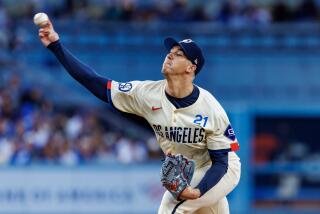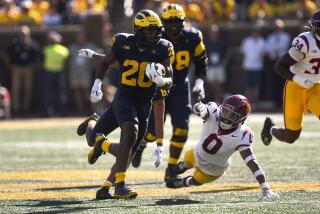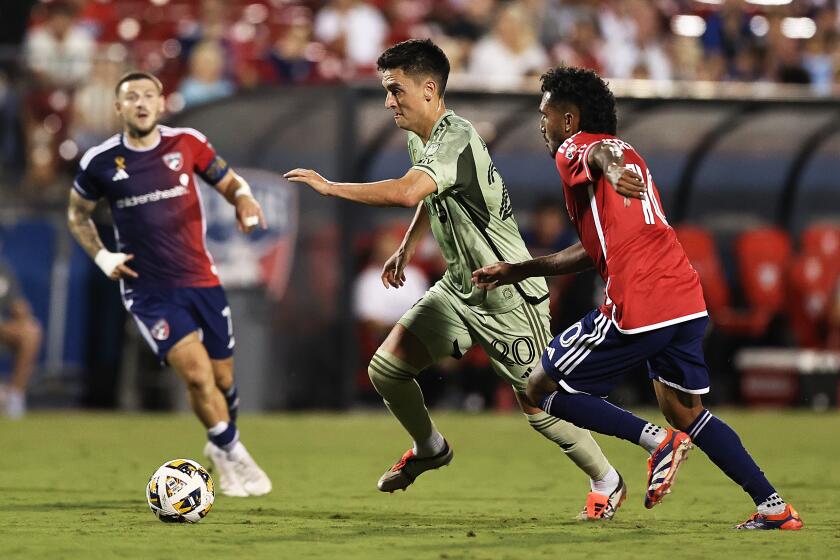Baseball to Impose Penalties for Steroid Use
In the first broad examination of doping within its ranks, Major League Baseball announced Thursday that more than 5% of random tests conducted on players last season turned up positive for steroid use.
The total was high enough to trigger a stricter testing regimen next season that will, for the first time, punish offenders. None of the dozens of players who tested positive were identified.
Baseball executives and players’ union leaders downplayed the results, saying that steroid use was less widespread than had been alleged and that steps were being taken to confront the problem.
“Hopefully, this will, over time, allow us to completely eradicate the use of performance-enhancement substances,” Commissioner Bud Selig said in a statement.
But observers of the game warned that baseball’s image might suffer on the news that perhaps 1 in 20 major leaguers had used muscle-building drugs.
“We’re talking about a lot of players that got caught,” said Paul Swangard, director of the Warsaw Sports Marketing Center at the University of Oregon. “That means someone going to a ballpark on a major league day was probably watching a player trying to break the rules.”
Thursday’s announcement comes amid a widespread investigation of steroid use on the international sporting scene.
A British sprinter and four American track and field athletes recently tested positive for a previously unknown steroid called tetrahydrogestrinone, or THG, which was not among the substances tested in baseball. It will be included in future testing.
A San Francisco grand jury is investigating a nutritional supplement company -- Bay Area Laboratory Co-Operative, or BALCO -- that officials have linked to the distribution of THG.
Victor Conte, the company’s owner, has denied wrongdoing. Dozens of BALCO’s celebrity clients have been subpoenaed to testify, including San Francisco Giants slugger Barry Bonds and Jason Giambi of the New York Yankees.
Doctors have long used anabolic steroids to help build muscle mass in patients suffering from a variety of illnesses. But medical officials say that when taken improperly by athletes seeking to become faster and stronger, the substances can have long-term health consequences.
Such misuse has been whispered about among fans and players, especially in recent seasons as home-run totals soared.
“From a player’s standpoint, we suspected it,” Angel outfielder Tim Salmon said Thursday.
“You looked around and saw some performances where guys were putting up numbers out of whack with their career numbers and you sit back and say, ‘What’s going on?’
“When performances are questioned, that’s bad for the game in the long run.”
Last year, in a Sports Illustrated article, former player Ken Caminiti acknowledged using steroids during his 15-year career.
Another prominent retired player, Jose Canseco, had previously estimated that 85% of big leaguers use steroids.
On Thursday, players’ union officials said the test results showed no widespread abuses.
“Plainly, many of the widely publicized claims regarding steroid use in the sport turn out to have been grossly uninformed,” said Gene Orza, associate general counsel of the players’ union.
For years, even as professional football and basketball instituted steroid testing, the baseball union resisted such a program.
The issue was hotly contested when owners and players negotiated a labor contract last year.
The union ultimately agreed to accept anonymous testing of every player for a survey. If positive results surpassed the 5% threshold, a program of testing and penalties would be established for 2004.
Because players received several months’ warning before the tests began in spring training, many in baseball doubted that positive results would reach the required percentage.
However, 5% to 7% of the 1,438 tests came back positive.
“To get a 5% to 7% positive response rate, even though everyone knew the tests were coming, indicates the problem is far more widespread than baseball is ready to admit,” said Dick Pound, president of the World Anti-Doping Agency in Montreal.
Major League Baseball said in a statement that the actual number of athletes that are using steroids was “not determinable.”
A total of 1,198 ballplayers were tested, with 240 of them selected at random for a second test. It was not known how many players, if any, produced two positive results.
The new regimen, which begins in March, will carry a range of potential punishments.
First-time offenders will be placed in a treatment program but will not be named publicly. For subsequent positive tests, players can be suspended for up to one year or be fined $10,000 to $100,000.
Testing will continue for two seasons. A third season would be added if positive results exceed 2.5%.
“I think it’s a good day,” Salmon said. “There’s been enough speculation. It’s good they’re going to do something.”
*
Times staff writers Ross Newhan, Bill Shaikin and Alan Abrahamson contributed to this report.
*
(BEGIN TEXT OF INFOBOX)
Baseball’s new rules on steroids
* Starting next year, a first positive test for steroid use would result in treatment, and a second in a 15-day suspension or fine of up to $10,000.
* The length of penalties would increase to a 25-day suspension or fine of up to $25,000 for a third positive test, a 50-day suspension or fine of up to $50,000 for a fourth, and a one-year suspension and fine of up to $100,000 for a fifth.
* The suspensions would be without pay.
Source: Associated Press
Los Angeles Times
More to Read
Go beyond the scoreboard
Get the latest on L.A.'s teams in the daily Sports Report newsletter.
You may occasionally receive promotional content from the Los Angeles Times.











